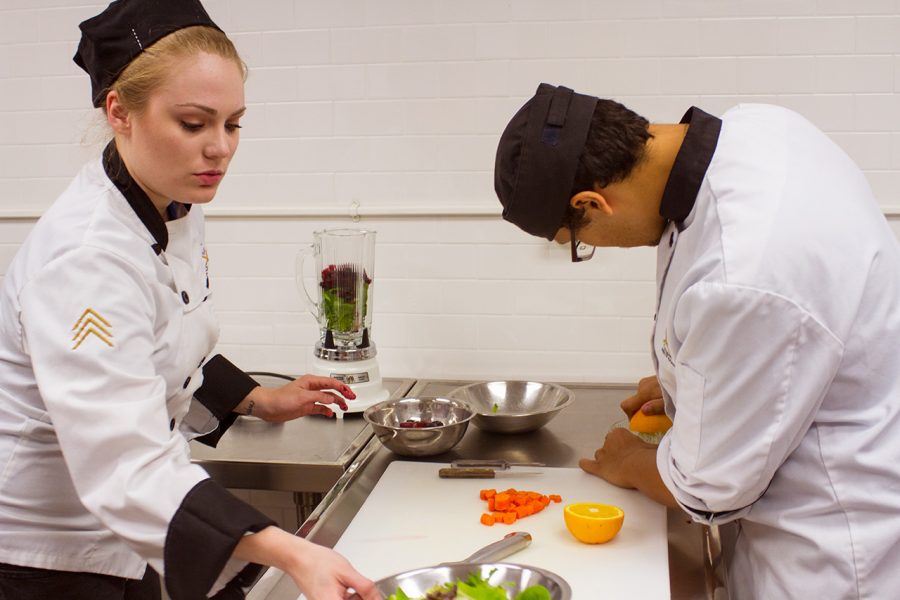Culinary arts concentration helps prepare students for variety of careers
September 6, 2012
One of the growing studies offered at UNA is a culinary arts concentration in Human Environmental Sciences according to UNA’s website.
According to UNA’s website, The Alabama Commission on Higher Education authorized the four-year culinary arts concentration in June 2007. The concentration is located at UNA’s Culinary Center on the East Campus.
Assistant Professor and Director of Culinary Facilities Chef Johnson Ogun said the concentration teaches applied skills, using all techniques relevant to the different methods of culinary practice.
Rebekah Kaufmann, a culinary arts major, said students are taught diverse, globally-used cooking processes.
Cooking is only one aspect of the Culinary Arts concentration Kaufmann said.
“Much of the culinary arts concentration is how to manage a business, restaurant, or any form of hospitality environment,” Kaufmann said.
According to UNA’s website, students in this concentration are equipped with knowledge of culinary arts, facilities management, budget and cost control, appreciation of cultural diversity, visual presentation of food and the educational requirement needed for chef certification.
Ogun said grades are “broken down into three components: lectures through the classroom, laboratory experience and clinical hours, where students gain outside the classroom experience in the workforce.”
Students in the culinary arts concetration are also involved in community service projects in Florence and nearby cities.
Ogun said one such project will be at the YMCA this year, where students are “doing a demonstration promoting healthy living and nutritional values.” Ogun said they have also done career day demonstrations of skills for high schools.
Another event for the culinary arts concentration is a five-course scholarship fundraiser meal Sept. 15 benefitting the UNA Culinary Arts and James Beard Scholarship Funds. Ogun said the Marriot is putting the event together and that the culinary arts concentration is collaborating with them to make it happen.
Kaufmann said sometimes there is a big project at the end of the year where students make a meal that corresponds with their class.
“We usually invite faculty, friends and family, and our food is judged by chefs from local, well-established restaurants,” Kaufmann said. “It’s good to get the perspective of professionals,”
Ogun said classes may also go on field trips to venues such as Wayne Farms or the Atlanta Farmers’ Market.
Kala Hillis, culinary arts major, said her favorite part of the program is “when we are hands-on with the food.”
“Sometimes (Ogun) will give us a recipe and just let us make homemade bread or pasta,” Kaufmann said.
Most of the products prepared by the students during the last four years are in the Culinary Club’s cookbook, which was published last semester and can be purchased through the HES Department.
“Most past graduates of the culinary arts are working in different fields,” Ogun said. “For example, we have three working with the Marriot, two at 360 Grille and one at the Conference Center.”
He said another graduate is working in Decatur at the Southern Sensation Bakery and that some seniors are working at The Pointe and The Sweet Magnolia Cafe.
One graduate is currently in California working as an assistant food stylist for the Hunger Games movies.
“Every food that is in the movie they are involved with is put together by the food stylist team,” Ogun said.
A new instructor, Chef Prema Monteiro, was recently hired for the culinary arts concentration. It previously had only two chefs, Ogun and Chef Lewis Yuille.
“(Monteiro) has so much knowledge about food, and she’s a genuine person,” Hillis said. “You can tell that she really cares about seeing the students succeed.”












